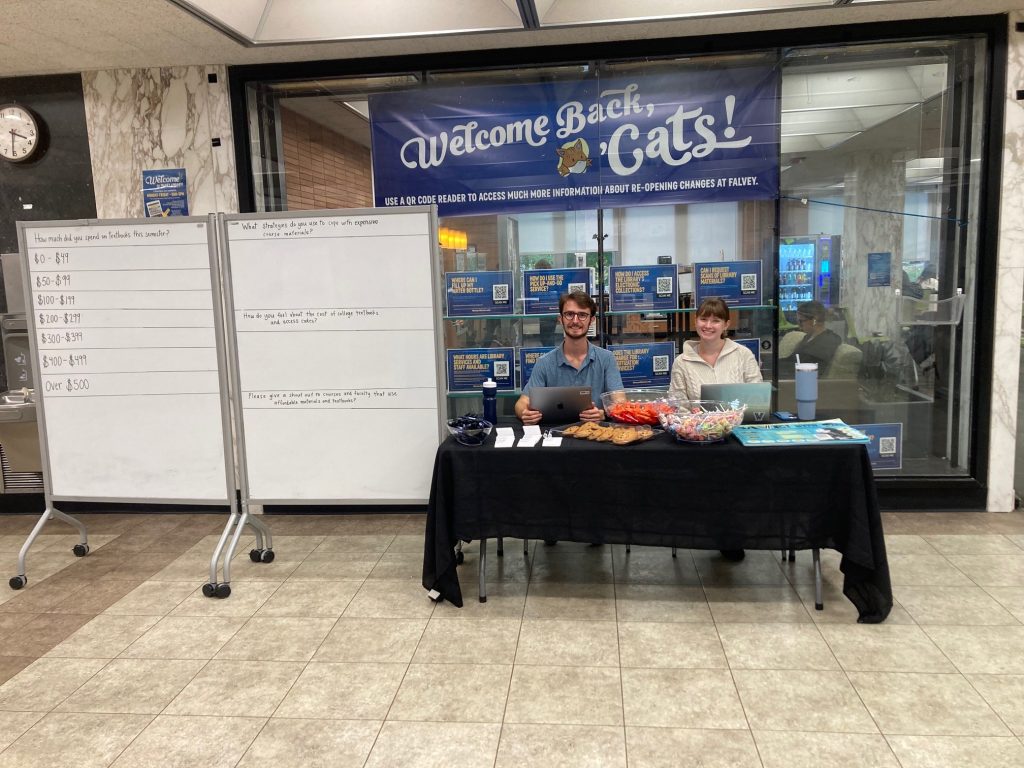
The OER (Open Educational Resources) Faculty Adoption Award Forum, held virtually on March 9, highlighted the diverse and flexible nature of openly licensed course materials and shined a light on student’s preference for free digital materials.
Professor Jeanne Liedtka, JD, received the award to transition the Law of Contracts and Sales elective to using OER. Not a newcomer to OER, she had previously used OER in the popular Intellectual Property (IP) Law for Business course. Liedtka compared and contrasted both successful experiences. IP is a dynamic branch of law heavily dependent on case law. A law school text, Boyle & Jenkins’ Intellectual Property: Law and the Information Society: Cases and Materials, served as the backbone of the course. Her undergraduate student’s weren’t phased by materials designed for law school students, but Liedtka did go the extra mile to supplement the text with articles centering business perspectives on IP issues and recent cases in the public domain. Liedtka noted that contract law is less dynamic field, and she had well developed lectures notes that served as the core of the course, so Introduction to Contracts, Sales & Product Liability, written for undergraduates, was a serviceable reference. She encouraged faculty interested in exploring OER adoptions to contact their subject librarians who can map available OER to course outlines and syllabi.
Valentina DeNardis, PhD, shared her personal and professional reasons for adopting Dickinson College Commentaries, to the Classics course, Readings in Authors. As a first generation student herself, Dr. DeNardis recalled feeling overwhelmed by the cost of texts and being stressed when the edition of a text she needed to use far exceeded the price for alternatives. In a grad school class, where she met her husband, she had to purchase a very costly scholarly monograph that was never even used, so now they have two pristine copies in their home. From a teaching perspective, Dr. DeNardis noted that affordability isn’t the only reason to choose openly licensed materials. Digital is convenient, flexible, and accessible. Because classics studies require a wide range of very expensive materials including texts, dictionaries, grammar books, translations, and essays, the Commentaries supplemented with Library-subscribed content was ideal. Dr. DeNardis built a Microsoft OneNote notebook to deliver the content and as a forum for student collaboration.
A panel of students spoke to the social and academic benefits that flowed from using OER. Olivia noted that the online platform was better for visual learners because it facilitated looking up maps, videos, and images. Lauren felt that digital materials made it easier to do translations, because she could easily toggle between dictionaries. Anna liked digital sticky notes, which are environmentally friendly! From a pocket book point of view, Valeria noted that in fields with rapidly evolving developments having a current text is important, but it is distressing that the resale value of commercial textbooks diminish fast due to constant updates. Tuition increases and expensive textbooks can make it hard for some students to stay in college. She felt that using OER allowed everyone to be in the conversation and made class debates fun.
When asked about their overall experience with college textbooks, Olivia recommended frequent and early alerts about required books because discounted books sell out fast and delays in shipping can cause students to fall behind in their work. It was a relief to Lauren to find out on the first day of class that she didn’t have to pay for any books. Valeria said “eliminating the economic barrier of buying books gets everyone involved..[which] helps professors and students.” She observed that students can be discouraged from taking a class or minoring in a subject because of expensive materials, whereas free or low cost books promote exploration. One student asked if professors are required to assign textbooks, even when they don’t intend to rely on them heavily, and wished that they would let students know up front when that is the case.
Dr. DeNardis explained that she hopes the effort she made finding and using affordable materials will serve as a model for her peers. Liedtka explained that at VSB faculty teaching core courses are encouraged to use the same text to ensure a consistent student experience, and that faculty have the freedom to design the course around the textbook, sometimes using relying on it heavily or sometimes only as a reference.
The forum concluded with a discussion about how to advance the use of OER at Villanova. On the demand side, both Dr. DeNardis and Liedtka recommended awards and grants, faculty surveys, forums and programs, and library services. On the demand side, both suggested encouragement and support for Villanova faculty authoring OER. They observed that authoring OER ensures the availability of great content and noted that it would enhance University branding and raise the profile of programs.
The 2022-23 Faculty Adoption Grant is accepting applications. Visit this site to apply.
A recording of the OER Faculty Adoption Award Forum is available.
 Linda Hauck is the Business Librarian at Falvey Memorial Library and Affordable Materials Project member.
Linda Hauck is the Business Librarian at Falvey Memorial Library and Affordable Materials Project member.

 Linda Hauck, MLS, MBA is the Business Librarian at Falvey Library.
Linda Hauck, MLS, MBA is the Business Librarian at Falvey Library.
 Economics tab and Search all Categories box enable drilling down to the cities and variables needed.
Economics tab and Search all Categories box enable drilling down to the cities and variables needed.




 Factiva’s Company/Markets tab is an added bonus. Company profiles describe the business segments, corporate family, financial results, and peers, but their real advantage is the depth and breath of company news provided. The industry snapshots are less robust, but do rank key competitors, facilitate a deep dive into the news, and offer recent analyst reports.
Factiva’s Company/Markets tab is an added bonus. Company profiles describe the business segments, corporate family, financial results, and peers, but their real advantage is the depth and breath of company news provided. The industry snapshots are less robust, but do rank key competitors, facilitate a deep dive into the news, and offer recent analyst reports.



